Solar panels generate electricity from sunlight, efficiently converting DC to AC for various uses. Although output varies with weather, they produce power even on cloudy days and at night with backup systems. Despite initial costs, solar energy offers long-term savings, is environmentally beneficial, and adaptable to diverse spaces thanks to advanced technology and innovative mounting solutions.
Unraveling the myths surrounding solar energy is crucial in understanding its potential as a sustainable power source. This article clarifies five common misconceptions, empowering readers with accurate insights. We dispel the notion that solar energy is solely effective on sunny days, address its cost-effectiveness, and highlight its environmental benefits. Moreover, we explain that ample space isn’t always required for installation. By the end, you’ll discover why solar power is a viable, eco-friendly option worth considering.
- Solar Energy Is Only Effective on Sunny Days
- It's Too Expensive to Install and Maintain
- Solar Panels Can Harm the Environment
- You Need a Large Space for Solar Panel Installation
Solar Energy Is Only Effective on Sunny Days

Many people believe that solar energy is only effective during sunny days, but this isn’t entirely true. Solar panels generate electricity through the conversion of sunlight into direct current (DC) electricity, which is then inverted to alternating current (AC) for use in homes and businesses. Even on cloudy or overcast days, solar panels can still produce power because they absorb light from the sun and convert it into energy. While the amount of energy generated may be lower than on a bright, sunny day, modern solar panels are designed to function efficiently under various lighting conditions.
In fact, even during night time hours, solar energy systems can continue to generate electricity through the use of stored energy or, in some cases, with additional battery backup. This makes solar energy a reliable and consistent source of power, not just for sunny days but throughout the year. So, regardless of the weather, solar energy is a viable and efficient option for reducing reliance on traditional energy sources and contributing to a more sustainable future.
It's Too Expensive to Install and Maintain

Many people believe that solar energy is too expensive, both upfront and for ongoing maintenance. However, this perception often overlooks the significant cost savings over time. While the initial installation costs can be high, the long-term benefits are substantial. Solar panels have become increasingly affordable in recent years, with technology advancements driving down prices. Moreover, many governments offer incentives, grants, and tax credits to promote the adoption of solar energy, making it more accessible and financially viable for homeowners and businesses.
Regular maintenance is required for any renewable energy system, but the good news is that solar panels demand relatively little upkeep compared to traditional energy systems. Simple cleaning and occasional checks are usually sufficient. Most modern solar panels also come with extended warranties, ensuring peace of mind. Additionally, as technology evolves, panel efficiency improves while production costs decrease, making solar energy an increasingly attractive and cost-effective option for everyone considering a switch.
Solar Panels Can Harm the Environment

One of the most common myths surrounding solar energy is that it’s harmful to the environment. This misconception often arises from concerns about the production and disposal of solar panels. However, it’s essential to understand that modern solar technology has significantly reduced these environmental impacts. Solar panels are made from recyclable materials, and with proper recycling programs, their end-of-life impact can be minimal. In fact, using solar energy itself helps reduce carbon footprints by providing clean, renewable power without emitting harmful greenhouse gases.
Moreover, the benefits of solar energy far outweigh any potential drawbacks. Solar panels do not contribute to air or water pollution, and they minimize the environmental disruption often associated with traditional energy sources. As the world shifts towards more sustainable energy practices, solar energy is emerging as a powerful ally in preserving our planet’s ecosystems and combating climate change.
You Need a Large Space for Solar Panel Installation

One of the most common misconceptions about solar energy is that it requires a vast amount of space for efficient installation. However, this couldn’t be further from the truth! Solar panels are versatile and adaptable to various settings. Whether you have a rooftop, an open yard, or even limited balcony space, solar energy can still be harnessed effectively. Modern solar panels are designed to maximize energy absorption within smaller areas, making them suitable for both residential and commercial properties with diverse layouts.
The efficiency of solar panel systems doesn’t rely solely on size but also on proper orientation towards the sun and optimal angle of installation. With innovative mounting solutions available today, it’s possible to create custom arrangements that accommodate different space constraints while still delivering significant returns on your investment in solar energy.
In dispelling common myths about solar energy, it’s clear that this renewable power source offers numerous benefits. Solar energy is not limited to sunny days, as advancements in technology allow for efficient energy generation even on cloudy or partly cloudy days. Despite initial installation and maintenance costs, the long-term savings make it a financially viable option. Far from harmful, solar panels contribute to a greener environment by reducing reliance on fossil fuels. Moreover, modern solar panel systems can be installed in various spaces, from rooftops to ground-mounted arrays, catering to diverse locations and needs. Embracing solar energy is not just an environmental choice; it’s a step towards a more sustainable and cost-effective future.
